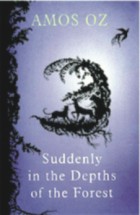Book Review
Horrors of Life
This fable, though based on fairytales told by the writer's mother, is informed by the horrors of real life
David Mattin
 |
Suddenly In the Depths of the Forest
by Amos Oz
144pp, Chatto & Windus, £12.99 |
In Amos Oz's 2004 memoir, A Tale of Love and Darkness, provided a mesmerising insight into the childhood of Israel's greatest living writer. In one passage, Oz remembers the strange fairytales that his mother, Fania, would tell him in their Jerusalem kitchen. They came, he says, "…veiled in a kind of mist, as though they did not begin at the beginning or end at the end, but emerged from the undergrowth… and then slunk back to the forest they had come from".
These "forest fairytales" made an impression: in the memoir Oz reproduces them word for word. He speculates that the stories were his mother's way of communicating to him, unthinkingly, obliquely, the personal history that eventually overwhelmed her: Fania killed herself at the age of 38.
Oz's new work, a spare, short fable, constitutes his own "forest fairytale", his attempt to render, through this fantastical form, the collective trauma that has been the backdrop to his life and work. In a village far away there has been a strange catastrophe: every last animal has disappeared, so that for years "…it was always eerily silent... no bird chirped, no flock of geese crossed the sky, and the villagers barely spoke to each other beyond the essential things".
The village adults will not talk about their loss. Meanwhile, their children learn that if they dare venture into the surrounding forest they will be taken by Nehi, the Mountain Demon. But for two children Maya and Matti this will not do and they set out in search of the truth.
Oz transports his readers back to a childhood world of fairytale artefacts but it is hard to read suddenly without thinking, too, of the Holocaust and Israel's troubled history. Though no direct allegory of either, it seems to gesture towards them through its themes of shared catastrophe, persecution, banishment and return.
Soon enough, Maya and Matti are deep in the forest, where they encounter Nemi, a boy shunned by the village ever since he disappeared and returned days later, whooping like an owl. By now Maya has applied to her mission a kind of theological argument for the brotherhood of all living creatures, concluding that "anyone who mocks or hurts another passenger is actually being stupid and hurting the whole boat. After all, no one here has another boat". Communal trauma, Oz seems to say, exerts its effect on the individual psyche in strange and subtle ways.
opyright
(R) thedailystar.net 2010 |
